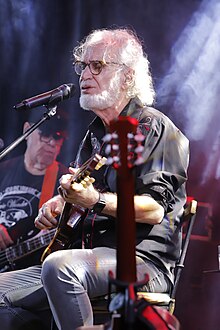
Cólera is a Brazilian punk rock band formed in October 1979 in São Paulo, by the brothers Redson and Pierre (drums) and their friend Val. They are currently one of the oldest punk bands in activity in Brazil, with a career that spans almost 30 years. They have toured Europe three times, in 1987, 2004 and 2008.

Djavan Caetano Viana is a Brazilian singer-songwriter.
Cordel do Fogo Encantado is a Brazilian band from Arcoverde who mix different Brazilian musical genres, such as samba de côco, toré indígena, embolada, and reisado, with pop-rock melodies. The band derives its name from cordel, a type of handmade illustrated pamphlet literature made by woodcut artists in northeastern Brazil. Cordel do Fogo Encantado is associated with Pernambuco's Mangue Beat, a musical movement that is repopularizing traditional northeastern Brazilian folkloric musical genres by mixing them with rock and funk music.

Arnaldo Antunes is a Brazilian musician, writer, and composer. He was a member of the rock band Titãs, which he co-founded in 1982 and left ten years later. After 1992, he embarked on a solo career. He has published poetry and had his first book published in 1983. He has worked with Marisa Monte, Tribalistas, and Carlinhos Brown.

Elza da Conceição Soares, known professionally as Elza Soares, was a Brazilian samba singer. In 1999, she was named Singer of the Millennium along with Tina Turner by BBC Radio.

Marcelo Maldonado Peixoto, also known as Marcelo D2, is a Brazilian rapper and singer.

Erasmo Carlos was a Brazilian singer and songwriter, most closely associated with his friend and longtime collaborator Roberto Carlos. Together, they created many chart hits including "É Proibido Fumar", "Sentado à beira do caminho", "Além do Horizonte", "Amigo" and "Festa de Arromba".

André Cibelli Abujamra is a Brazilian score composer, musician, singer, guitarist, actor, and comedian of Lebanese and Italian origin. Both his father, Antônio Abujamra, and cousin, Clarisse Abujamra, are actors.

Fafá de Belém, born Maria de Fátima Palha de Figueiredo in Belém do Pará on August 9, 1956, is a Brazilian singer considered one of the great female singers of MPB. She took her stage name from the city of her birth and in addition to a successful recording career that spans over three decades, it is fair to say that she has been one of the great sex symbols of Brazilian pop music. Her husky mezzo-soprano voice is known for its extensive emotional range, from tender ballads, to sensual love songs, to Portuguese fados all the way to energetic sambas and lambadas.

Yamandu Costa, sometimes spelled Yamandú, is a Brazilian guitarist and composer. His main instrument is the Brazilian seven-stringed classical guitar.

Sergio Bavini, known as Sérgio Reis, is a Brazilian sertanejo singer, actor and politician. He has sold approximately 16 million copies of his more than 40 album releases.
The Latin Grammy Award for Best Portuguese Language Album is an honor presented annually at the Latin Grammy Awards, a ceremony that recognizes excellence and creates a wider awareness of the cultural diversity and contributions of Latin recording artists in the United States and internationally.

Hamilton de Holanda is a Brazilian bandolinist known for his mixture of choro and contemporary jazz, and for his instrumental virtuosity. Born in Rio de Janeiro he moved to Brasilia with his family as a boy. He started playing the bandolin at 5 and appeared at his first performance at six. With his brother Fernando César he formed the group Dois de Ouro and throughout his career he has collaborated with many other significant artists such as Yamandu Costa, Mike Marshall and Joel Nascimento. He has received several Latin Grammys. He has taught at the Raphael Rabello Choro academy. He plays a custom made 10 string Bandolim.

Almir Eduardo Melke Sater is a Brazilian singer-songwriter and actor.
Sérgio Roberto Veloso de Oliveira, known as Siba, is a popular Brazilian folk-rock singer and songwriter. Sergio Veloso, or Siba, founded the band Mestre Ambrósio which was popular in the 1990s. After 2000 he turned to folk music with the band Fuloresta, backed by traditional brass musicians, and then in the late 2000s to experimental and electric music with Avante (2012). In 2015 Siba returned to more political themes with De Baile Solto. His album Coruja Muda was considered one of the 25 best Brazilian albums of the second half of 2019 by the São Paulo Association of Art Critics.

Isabela Cristina Correia de Lima Lima, known professionally as IZA, is a Brazilian singer, songwriter and dancer, who rose to fame recording cover songs of artists such as Beyoncé, Rihanna, and Sam Smith on her self-titled YouTube channel. She has also featured her songs on Spotify and SoundCloud. In May 2016, she signed a contract with Warner Music Brasil. Her debut album, Dona de Mim, was released in 2018 and was nominated for a Latin Grammy Award for Best Portuguese Language Contemporary Pop Album.

O Tempo É Agora is the second studio album by Brazilian duo Anavitória, released on 3 August 2018 via Forasteiro and Universal. It was produced by Moogie Canazio and Tiago Iorc, the latter continuing his role from their first album. Em 2019, the album won the Latin Grammy for Best Portuguese Language Contemporary Pop Album.

O Terno is a Brazilian rock band from São Paulo, consisting of singer-songwriter Tim Bernardes, bassist Guilherme D'Almeida and drummer Gabriel Basile. Formed in 2009, the trio began performing covers of songs by Os Mutantes, The Beatles and The Kinks before releasing original music. The band is considered a fixture of the contemporary Brazilian independent music scene, being one of the founders of the independent music label Selo RISCO.

Eduarda Bittencourt Simões, better known as Duda Beat, is a Brazilian singer and songwriter. She won the ACPA Award for Breakthrough Artist in 2018, and her debut album Sinto Muito was listed among Rolling Stone Brasil's best 50 Brazilian records of that year. Duda Beat was nominated for a 2021 Latin Grammy Award for Best Brazilian Contemporary Pop Album for her album in partnership with Nando Reis.

Ave Sangria is a Brazilian rock band and one of the leading names of the 1970s psychedelic music scene of Pernambuco, along with Alceu Valença, Flaviola e O Bando do Sol, Lula Côrtes, Marconi Notaro and Lailson.
















